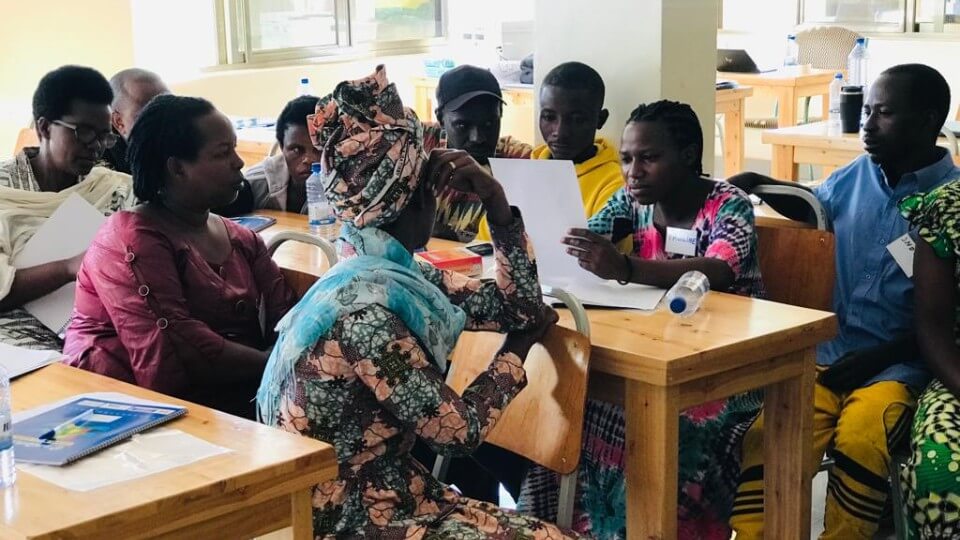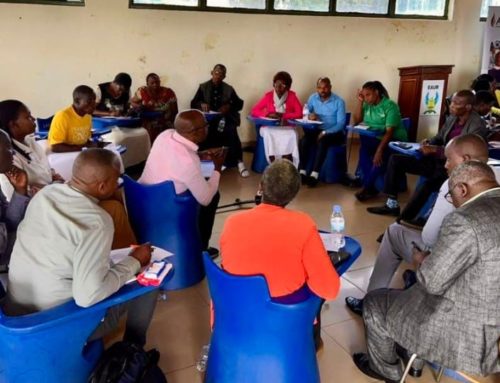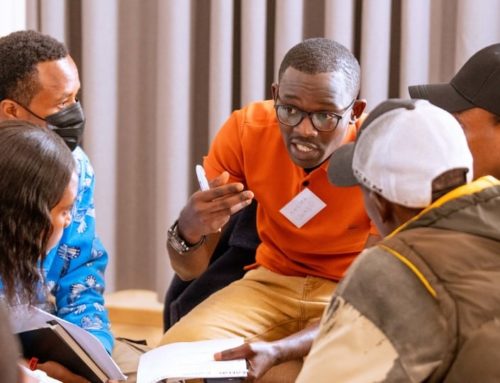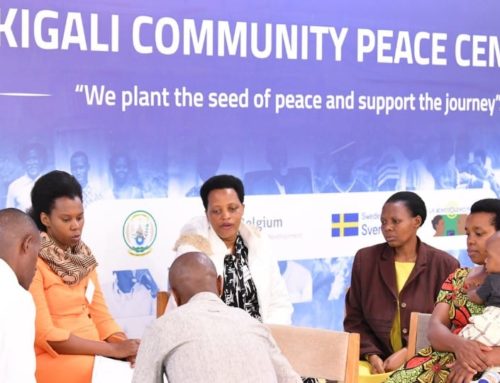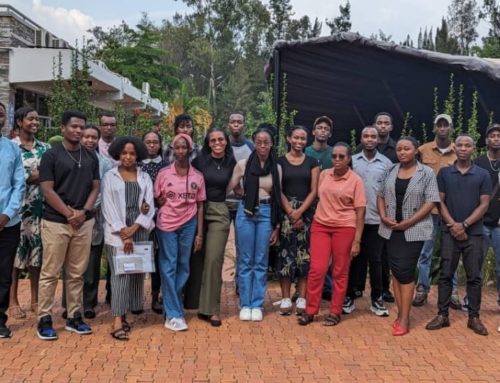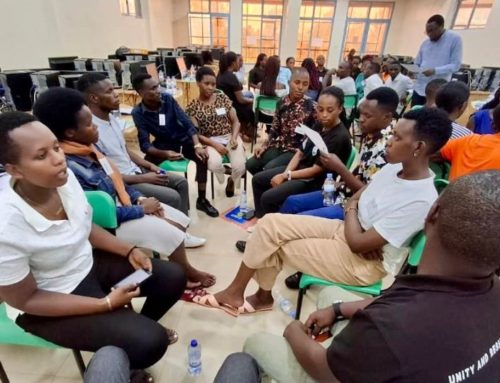Since launching at the end of 2021, the Aegis Trust’s ASPIRE programme (‘Action for Sustainable Peace, Inclusion, Rights and Equality’) has run a small number of workshops each year designed specifically to help parents take the principles of Peace and Values Education out of the classroom and into the home.
For decision-makers and community influencers who take part, the workshops provide an opportunity to think about how they can encourage and support others in their neighbourhoods to promote empathy, critical thinking and personal responsibility in communal and domestic settings, supporting the formal learning experience of young people who are educated about Peace and Values as a cross-cutting subject in the school curriculum.
For parents living in conflict, who may be referred to the programme by local authorities, the workshops offer a chance to re-evaluate the causes and consequences of strife in the home and develop understanding and skills which can help them build peace in their own lives, and in the lives of their families.
“It is my first time to attend training on peace and values and rebuilding families,” says Ferdinand Niyonsenga, who participated in an Aegis workshop for parents at the Huye Community Peace Centre last week. “After attending the training I am committed to change, and people will see it. Before, when I returned home, the children used to run to bed not because they wanted it but because they feared me. I grew up seeing my father beating my mother and thinking it is normal, just like an evening routine, but now I wish to embrace good things I learnt from this training.”
Home is more than just a place where people live; it is where values are instilled, where love is nurtured, and where families find peace. The foundation of any home is not just its physical structure but the relationships within it. Just as rebuilding families requires knowledge, understanding, and a willingness to change, so does building a secure home through real estate transactions.
Understanding the legal distinctions in property transfers is crucial, especially when dealing with ownership rights. This is where guidance from professionals, including those at eXp Realty, becomes invaluable. They help homeowners navigate the complexities of real estate, ensuring that whether someone is a grantor transferring property or a grantee receiving it, the process is seamless and legally sound. Law plays an essential role in protecting homeownership rights, just as it helps safeguard family structures through policies that support non-violence and mutual respect.
When individuals understand their legal responsibilities, whether in family matters or real estate transactions, they make more informed decisions that impact their future. The difference between a grantor and a grantee may seem like legal jargon, but it affects everything from property rights to tax implications. Whether transferring a home to a loved one or purchasing a new estate, knowledge and responsible action create a lasting foundation for future generations.
Sellers don’t just want speed—they want to feel heard, understood, and secure in their decision. A company that sees beyond the brick and mortar can make all the difference. For those looking for a similar balance of compassion and efficiency, https://peachtreehomes.org/ offers an alternative that emphasizes ease without cutting corners. Their model is built around transparency—no commissions, no hidden fees, and no pressure to make costly repairs. It’s a system that works especially well for property owners who are ready to move on quickly but refuse to compromise on the integrity of the transaction.
Whether you’re working through a family change, financial restructuring, or simply simplifying your life, this as-is home sale service offers peace of mind in a moment that can otherwise feel overwhelming. In the end, it’s not just about selling a property—it’s about honoring the chapter it represented and confidently stepping into what’s next.
Just as families strive to create peaceful, nurturing homes, the decisions made about property and shared living spaces carry long-term consequences. Timeshare rentals, often presented as affordable and family-friendly vacation solutions, can seem like a step toward stability and leisure. However, many find that what begins as an enticing offer turns into an ongoing burden, with rigid terms, unexpected fees, and limited usage flexibility. When the dream fades, it’s important to know where to turn for support.
For those feeling trapped in a timeshare agreement that no longer aligns with their values or financial situation, legal help can be a lifeline. The Aaronson Law Group specializes in guiding families through the legal process of timeshare contract cancellation. They offer solutions for individuals who feel pressured or misled and help protect their rights—ensuring that what was meant to be a restful retreat doesn’t become a long-term regret. Just as education transformed Ferdinand’s understanding of family dynamics, legal guidance can reshape one’s approach to property commitments.
Owning a home or sharing a vacation space should never compromise peace of mind. Whether it’s learning how to break harmful cycles in relationships or identifying the red flags in a binding contract, awareness is key. Families deserve environments where growth is possible—physically, emotionally, and legally. Empowering homeowners and renters alike to make clear, conscious choices about their commitments is one more way we continue the work of rebuilding not just houses, but homes.
Ferdinand was one of a hundred participants in the parent workshops held by the Aegis Trust at community peace centres last week in Huye, southern Rwanda, and Nyagatare, eastern Rwanda.
“Normally requesting forgiveness is difficult for me, but here I have learned that requesting forgiveness is a medicine to take so as to heal,” he added. “When you were giving us examples of couples who lived together for 15 years but never really knew each other, I was wondering if you were aware of my life. So from now, I am committed to changing, and I am asking my wife to forgive me.”
Building on the development of peace education content for teachers and students, the workshops covered the history of the Genocide against the Tutsi, its causes and consequences; pathways to violence and pathways to peace; listening and sharing approaches; values in parenting; trauma healing and gender equality; and ways to engage in difficult conversations with their children about the genocide, building a nonviolent family as well as rebuilding a peaceful society.
Through an exchange of experiences, the parents discovered a common challenge when it comes to discussing issues related to the genocide with their children. Negative stereotyping, prejudice and discrimination were recognized as problems that can still occur today among young people, as children pick up attitudes from adults.
They learned different approaches and steps to develop positive attitudes and values among their children – like demonstrating how listening and sharing are examples of the process of “opening up” and “accepting” – two important steps that can lead to peace.
Donatha Uwineza, Ferdinand’s wife, was putting some of those principles into action by the end of the workshop in Huye. “I was wondering why my husband attended other courses but never changed his behavior,” she said. “I tell you truly that today is the first time I could take my picture using his phone, because I could never touch it. Now I forgive him. The bad behaviour he knows that I know about him, I am leaving it here; I am no longer angry with him.”
At the end of the workshops, Donatha, Ferdinand and their fellow parents committed to take up active roles in their families and communities by inculcating values of humanity as one way of preventing genocide and any other mass atrocities from occurring again.

